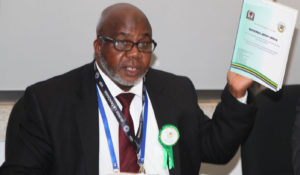by Ben Taylor
Two disputes flared up over the annual audits of the public sector conducted by the Controller and Auditor General (CAG), Prof Mussa Assad – one from previous years, and one new one.
The older case relates to the audit of central government accounts in the year 2016/17, the first full year of President Magufuli’s administration. When the audit report was first published early in 2018, opposition MP Zitto Kabwe highlighted an apparent discrepancy in the numbers – concluding that a huge sum (TSh 1.5tn, around US $600m) had gone missing. This prompted a great deal of debate at the time, with the government presenting a range of different, and sometimes contradictory, explanations, before parliament effectively put the issue on hold by tasking Prof Assad to conduct a special audit to investigate the reasons behind the alleged “missing 1.5 trillion”.
In January, Prof Assad presented this special report to parliament. The Public Accounts Committee (PAC) conducted its own review of the report, concluding that “there was no loss or theft”. The report itself, however, was not published, leading to allegations of a whitewash. Opposition PAC members noted new discrepancies uncovered by the special audit that the committee’s review neglected to mention.
The report leaked. As one analyst concluded: the report “did indeed uncover many anomalies, enough to paint a very disturbing picture. We don’t see a bank heist as such, but we do see something like all the cash from a vault strewn in mind-boggling confusion across the floor.”
Anomalies highlighted in the report include TSh 977bn of unauthorised reallocations, TSh 657bn discrepancy between Exchequer Issues Warrants and the Exchequer Release Report, and TSh 291bn of unsupported overdraft.
In all, while the report did not conclude that the supposed TSh 1.5tn had indeed been stolen, it did report discrepancies totalling TSh 2.4tn (over US $1bn).
Perhaps most significantly, the report itself bemoaned the “lack of supporting documents and adequate explanations from Management (of the Ministry of Finance), which were necessary for ascertaining the accuracy and validity of amounts to be verified,”, and noted that “the provided information was scattered in numerous sections and were subjected to frequent adjustments in the course of verification.”
These strained relations between some MPs and the CAG may have contributed to the second dispute. MPs took offence at remarks made by Prof Assad in a media interview, where he described Tanzania’s parliament as “weak” for failing to follow up on the conclusions of his previous reports. In response the Speaker, Job Ndugai, demanded Prof Assad to appear before the Parliamentary Privileges, Ethics and Standards Committee. “You can’t speak badly of your country when you are outside the country,” said Mr Ndugai.
Prof Assad appeared before the committee on January 21. At the beginning of April, the committee presented a motion to parliament stating that Prof Assad had “disrespected MPs” and that parliament should stop working with him. MPs overwhelming voted in favour of the motion.
This threatened to trigger a constitutional crisis, as Prof Assad’s role as CAG is established by the constitution, which requires that he present an annual report to parliament. In the event, the potential crisis was averted when the reports were presented to parliament by various Ministers, rather than by Prof Assad himself. Meanwhile, Prof Assad held a press conference outside parliament where he highlighted the main issues identified in his reports. He also published the full reports online (as has been standard practice for several years).
As it happens, the report findings were arguably less controversial than in previous years. Of the 241 institutions whose financial statements were audited, 234 (97%) were awarded “clean” reports, compared to 88% in the previous year. However, questionable transactions revealed in the CAG report run into hundreds of billions of shillings of taxpayers’ money. Significant procurement weaknesses were found in the Police Force and National Electoral Commission, as well as problems with budget management.
The Citizen newspaper drew attention to one particularly pertinent conclusion of the reports: that only 23% of the CAG’s recommendations from past reports had been acted on. This was the very point Prof Assad had been making in his media interview that upset parliament.
“It is unacceptable that MPs are busy pointing fingers at the CAG” in such circumstances, said the paper, asking “where is their moral ground to do that?”

